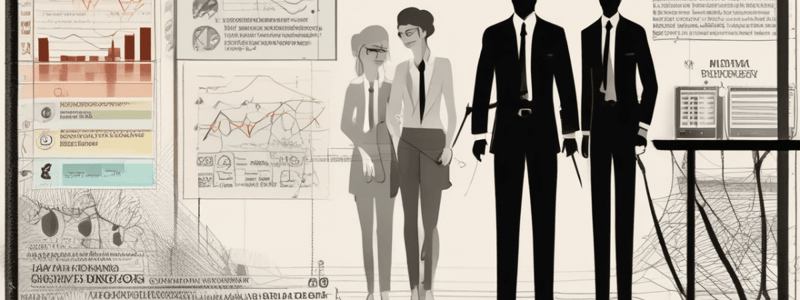Podcast
Questions and Answers
What is the primary factor that determines an individual's motivation according to Expectancy Theory?
What is the primary factor that determines an individual's motivation according to Expectancy Theory?
- The multiplication of Expectancy, Instrumentality, and Valence (correct)
- Instrumentality
- Valence
- The goal-setting process
Which theory suggests that it is not the rewards or outcomes of task performance that cause a person to expend effort, but rather the goal itself?
Which theory suggests that it is not the rewards or outcomes of task performance that cause a person to expend effort, but rather the goal itself?
- Motivation Theory
- Equity Theory
- Goal-setting Theory (correct)
- Expectancy Theory
What is the purpose of setting specific goals in the goal-setting process?
What is the purpose of setting specific goals in the goal-setting process?
- To provide a foundation for behavioral self-management
- To clarify performance expectations (correct)
- To establish a frame of reference for feedback
- To increase motivation through the reward system
What happens to motivation when either Expectancy, Instrumentality, or Valence is low?
What happens to motivation when either Expectancy, Instrumentality, or Valence is low?
What is the primary role of valence in Expectancy Theory?
What is the primary role of valence in Expectancy Theory?
What is the purpose of building goal acceptance and commitment in the goal-setting process?
What is the purpose of building goal acceptance and commitment in the goal-setting process?
What is the primary focus of reinforcement theory?
What is the primary focus of reinforcement theory?
Who developed the concept of operant conditioning?
Who developed the concept of operant conditioning?
What is the purpose of negative reinforcers in behavior modification?
What is the purpose of negative reinforcers in behavior modification?
What is the process of selectively reinforcing behaviors that are successively closer approximations to the desired behavior?
What is the process of selectively reinforcing behaviors that are successively closer approximations to the desired behavior?
What is the goal of extinction in behavior modification?
What is the goal of extinction in behavior modification?
What is the outcome of behavior modification, according to the text?
What is the outcome of behavior modification, according to the text?
What is the primary focus of the Expectancy Theory?
What is the primary focus of the Expectancy Theory?
What is the perception of capability in the Expectancy Theory?
What is the perception of capability in the Expectancy Theory?
According to the Expectancy Theory, what is necessary for motivation?
According to the Expectancy Theory, what is necessary for motivation?
What is the goal of minimizing negative consequences of equity comparisons?
What is the goal of minimizing negative consequences of equity comparisons?
Who developed the Expectancy Theory?
Who developed the Expectancy Theory?
What is the belief that the consequences will actually materialise in the Expectancy Theory?
What is the belief that the consequences will actually materialise in the Expectancy Theory?




